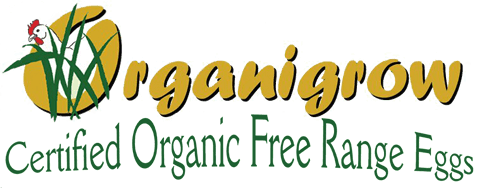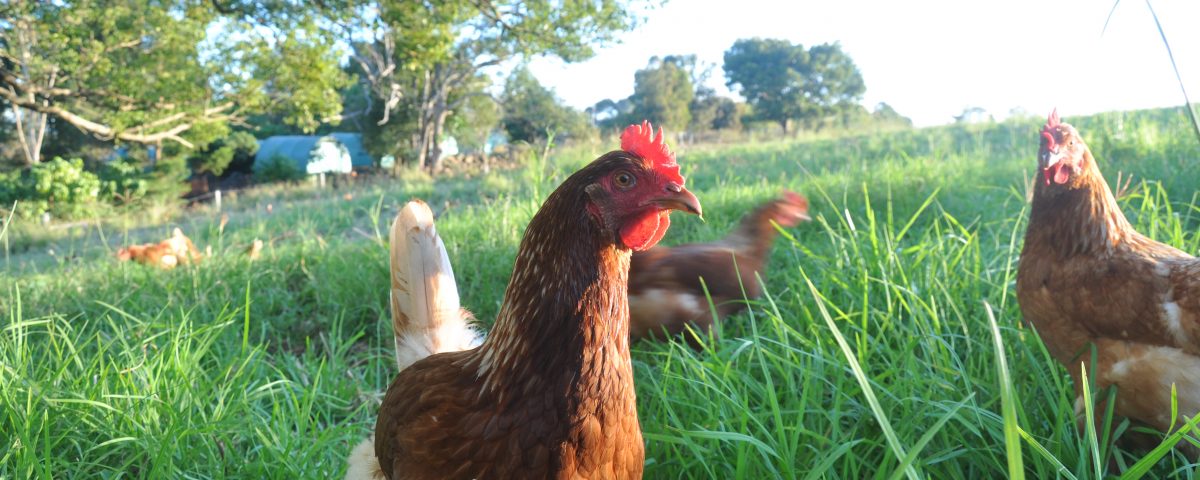- Certified Organic Free Range Eggs
- 0421 705 848
- simon@organigrow.com.au
Why Organic and Why Organigrow?

Organigrow and Sustainable Farming
November 9, 2018
Below is the interview with Simon that was recently published in one of the region’s local papers.
Simon Cripps Clark is the owner and manager of Organigrow, a certified Organic and Humane Choice egg farm located just outside of Lismore, New South Wales. In a frank discussion about food, health, sustainability and animal welfare we spoke with Simon about his farm practices, the hens and their eggs.
Simon, what made you choose organics and chickens?
I have always kept chooks from a small boy growing up in suburban Sydney and when I escaped to the country after school, I continued to develop my passion for giving chooks the best conditions in which they can thrive and lay the best eggs. Organic is a no-brainer; while chemicals on our food are a big risk to our health it is an
What do you do to ensure the welfare of your hens?
Chooks are quite intelligent and naturally curious. To ensure they are happy and healthy I strive to give them an enriched environment where they have plenty of their favourite things to do – scratching through deep litter for bugs and worms, out in the pasture looking for the best green peck, or dustbathing or sunbaking. The sun is the best disinfectant and the hens know it! To ensure the chooks have good health I feed them the best quality organic whole grain. Whole grain is alive and contains all the vitality designed to give the new generation the best start in life. This will also give the chooks the best nutrition. Once a seed is crushed it dies and with it dies most of the nutrition. Whilst some nutritional benefits are still there, the vitality, unoxidized oils and amino acids are lost.
Why is it so important that should people be eating organic?
It is pretty obvious that the thousands of poisons and chemicals that are added to our food are a danger to our health – one only has to look at the cancer rates to realise that something is seriously wrong with the way we produce food. Eggs are probably the worst offenders as the hen can bio-accumulate the chemicals in the environment and their food and pass then it on to the eggs. DDT was banned in the 70s after it was found to have accumulated from a ‘minute background level’ up to ‘concentrated’ in eagles to the extent that their eggs became soft and unviable.
What is sustainable farming and why do you do it?
Sustainable farming is the production of crops and stock in a way that minimises the effects on the environment. We only have one planet and if we don’t look after the land and do our best to make it better then what is the point of life? Using renewable energy, planting thousands of trees and minimising the impacts of farming on soil and water are all part of the bigger picture. By adding biochar to the feed, we can enhance the carbon capture and storage which is all part of dealing with the irrational exuberance which has lead capitalism down the dangerous path of loading our atmosphere with carbon dioxide.
Do sustainable farming practices cost more to set up?
Yes, they certainly do. The technologies, like solar, can be expensive as is the farm infrastructure. I need infrastructure that lasts and where possible is made from natural or recyclable materials rather than plastics/synthetics.
If sustainable farming is more expensive, what are the benefits overriding the expense?
The environment, the hens, our customers and those of us work and live on the farm all benefit, therefore it is a moral and ethical decision to farm this way. It may be more expensive but the long-term benefits are worth it!
What sustainable farming does Organigrow do?
We have a solar set-up that produces 95% of farm energy requirements, we source 100% of our water from the farm, I have planted approximately 10,000 trees on the farm over the years and we mulch and compost on site. I recycle by looking to fix or redesign things first rather than habitually throwing away and replacing. We reuse all materials and infrastructure wherever possible. We also source our grain, feed and biochar locally to minimise transport impacts to the environment.
What do you think are the best things that people can do every day to help the earth?
Use renewable energy, stop using plastic bags, buy product made from natural materials instead of plastic/synthetic, ride a bike or walk rather than drive, and eat organic food which is locally sourced.
Why buy Organigrow organic eggs instead of other ‘organic’ eggs?
Organigrow eggs are certified ACO, whereas many so called ‘organic’ eggs are not certified. Look for the ACO certification on the label of ‘organic’ eggs you buy. Organigrow eggs are also Humane Choice True Free-Range certified and very few egg companies have this accreditation. We know that humane treatment of our feathered friends is very important to many people nowadays. Humane Choice accreditation means you can be sure that the hens are not de-beaked and you can be guaranteed true free-range and a maximum of only 1500 hens per hectare, instead of the ACO 2500 per hectare. Organigrow hen stocking density is actually only 600 hens per hectare, and we will never de-beak or have de-beaked hens. Organigrow organic eggs taste amazing and are super healthy for you.
What are the nutritional benefits of eggs?
Eggs are often touted as nature’s multi-vitamin. With 1/3 of the Australian population being deficient in Vitamin D a serve of eggs provides more than 80% of the RDI of Vitamin D. A serve of eggs also gives up to 77% of daily needs for Choline, a nutrient particularly important for brain development, muscle growth, nervous system function, foetal development and metabolism of dietary fat and cholesterol. Eggs also provide protein, fat (two thirds of which is unsaturated fat), omega-3s, potassium, sodium, magnesium, phosphorus, iron, selenium, zinc, iodine, thiamine, riboflavin, vitamin B5, B6, B12, folate and vitamins A and E.
What is this misconception about cholesterol and eggs?
Eating eggs will actually reduce the cholesterol in your blood, as it helps the body to digest and break it down. Eggs have lots of LDLs and the body needs these LDLs to metabolise the harmful cholesterol. It is a myth that eggs will increase your cholesterol levels.
For very tasty, healthy and fresh certified organic eggs from a farmer who is passionate about the environment and the welfare of animals, buy Organigrow organic and truly free-range eggs.

